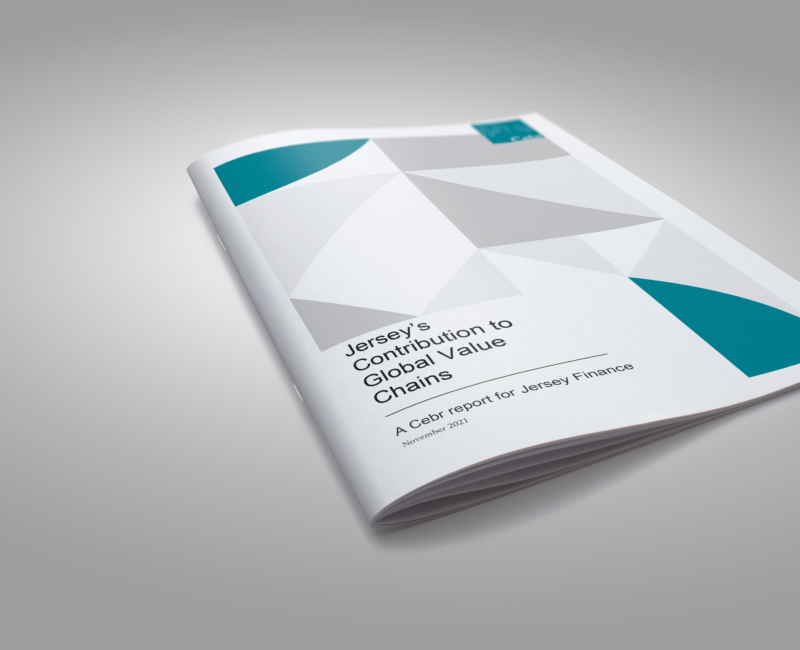in deposits
including over a third of the top 25 banks
working in our financial services sector
Because the banking industry is always changing, we’re always on hand to cater for niche and digital banking providers, as well as traditional institutions – working with some of the biggest names in the world.
Why Jersey for Banking?
Offshore banking played a key role in the development of Jersey as a leading international financial services centre. Here are some of the reasons we’re one of the world’s preferred banking partners:
- Our banking model is diversified and doesn’t rely on wholesale funding, meaning that money from other countries doesn’t go into the Jersey economy but instead goes to major banks in London, Paris, Frankfurt and other leading centres. This is why Jersey has received an AA-credit rating from Standard & Poors
- Jersey represents an extension of the City of London for corporate treasurers, institutional bankers and treasury specialists, fund promoters, brokers and other corporate financiers
- Jersey is home to global banking organisations from the UK, Europe, North America, South Africa, Asia, and the Middle East
- Jersey’s banking sector has been able to provide services to support the fast-growing alternative investment funds industry, in particular the real estate, private equity and hedge fund markets
- We provide an extensive range of services, including multi-currency offshore bank accounts, offshore mortgages, investment solutions and more
- There are more than 20 bank branches and subsidiaries located in Jersey and they include nearly half of the top 25 banks in the world, by Tier 1 Capital
- The Island’s banking industry services a wealth of other financial services businesses locally as well as internationally and within the wider financial service sector, including private wealth, investment, fiduciary and custodian management
Regulation
Jersey offers the highest regulatory standards to ensure the continuance of its position as a leading international finance centre of repute.
The rigorous systems, protocols and requirements in place contribute to Jersey’s positive reputation as a world-leading international finance centre and its regulatory environment is constantly evolving to protect its stakeholders and maintain the jurisdiction’s reputation as an international finance centre of excellence. Jersey’s robust regulatory framework meets the highest international standards of regulation and is overseen by the Jersey Financial Services Commission, the Island’s regulatory authority.
- With an AA-credit rating from Standard & Poor’s, Jersey is one of the world’s preferred banking partners
- Jersey is ranked 21st in the Global Finance Centres index, and 1st in the offshore rankings. The branches and subsidiaries of the major international banks established in Jersey must meet strict local and international regulatory requirements as well as industry best practices
- Jersey’s banking sector holds an average Tier 1 Capital ratio that’s 50% higher than Basel III requirements, an international regulatory accord that introduced a set of reforms designed to mitigate risk within the international banking sector
- Jersey has a well-established reputation for adhering to the highest regulatory standards in tax compliance, cooperation and transparency, something that has been verified time and again by bodies including the OECD, the FATF and indeed the EU
- Jersey is not part of the UK or EU. For financial services, it has access to the EU market through its own bilateral agreements and arrangements, which are independent from the UK’s relationship to the EU. Therefore, Jersey’s financial services industry continues to operate in both the UK and EU after Brexit as it did before
For more information on regulation, view our Transparency Timeline.
You can also visit Jersey’s Regulator’s website
Jersey Banks' Contribution to Global Value Chains
Research from the Centre for Economics and Business Research (Cebr) found that on average annually during the period examined (2017-2020), Jersey’s banking sector supported a scale of economic activity in line with the total GDP of Iceland in 2020.
Work
Current Trends in the Banking Industry

While ESG investing has been gaining pace steadily over a number of years, the use of environmental, social and governance (ESG) factors in financing arrangements has seen a more recent surge. Also known as sustainability linked lending (SLL), this approach can enable borrowers to pay lower interest rates by meeting a lender’s key performance indicators (KPIs).
SLL is just one of the ways that Jersey’s banking institutions are supporting the growth of sustainable finance. Nine out of the top 10 banks in Jersey by total assets have committed to the United Nations Principles for Responsible Banking (PRB). The PRBs were established in 2019 to encourage the banking community to make a positive contribution to people and the planet by aligning their business practices with the UN’s Sustainable Development Goals and Paris Climate Agreement. Locally, our banks support Jersey’s transition to a more sustainable island through green loans and other initiatives that focus on tackling the climate emergency.
Sustainability and Banking Resources


The Future of Banking Review was created to analyse the challenges faced by the Jersey banking sector and outline strategic objectives to safeguard the future. The report analysed a wide range of challenges, from regulatory developments to disruptive technologies, and identified three vital areas:
- Banking groups consolidating operations across IFCs, with a focus on cost-cutting, quality and increased regulatory costs
- Digitisation of services, which are putting pressure on banks’ offshore operations
- The de-leveraging of the global banking system, which is restricting the profitability and growth of Jersey’s banks
From these challenges, we’ve developed a positive action plan that involves working with our stakeholders, Digital Jersey and the whole financial services industry. Together, we’ll focus on three clear objectives:
- Make certain that Jersey emerges as a leader from the consolidation of banks
- Run new banking activities to increase the value in our banks’ deposit books
- Work with digitisation and innovation to help us maintain employment and competitiveness in the future
For banks or advisors interested in exploring the opportunities in Jersey, please get in contact with robert.moore@jerseyfinance.je


Open banking is an initiative designed to boost competition and the variety of products in the banking, credit cards, and payments space.
Financial institutions must securely ‘open’ their client data to approved third parties that the clients explicitly opt in to as they wish to use open banking products and services.
In the UK, the nine largest banks (Allied Irish Bank, Bank of Ireland, Barclays, Danske, HSBC, Lloyds Banking Group, Nationwide, RBS Group, Santander) are mandated by the UK Competition and Markets Authority to allow open banking access. In Jersey, there is no open banking framework and a watching brief is being maintained on the success of Open Banking in the UK and local demand. Under Jersey law, there is no barrier to banks negotiating individual open banking style standards and contractual terms with third parties.
Careers in Banking
If you are interested in a career in banking, here are some resources you may find useful:
We’ve made it simple to understand how banking works and explained the differences between the various types of banks which exist in Jersey. We cover the different types of bank account available, offshore accounts, expat banking, foreign currency accounts, wealth management and asset management.
The financial services industry in Jersey has an excellent reputation internationally and is a leading player in private wealth, funds, banking and capital markets. Jersey’s highly-skilled workforce, world-class products and services, and high regulation standards make it one of the most respected financial services centres in the world.
The banking industry within it is very diverse, with more than 20 bank branches and subsidiaries located in Jersey and they include nearly half of the top 25 banks in the world, by Tier 1 Capital, providing domestic banking services on the high street, as well as many others concerned with providing services to customers residing across the globe.








